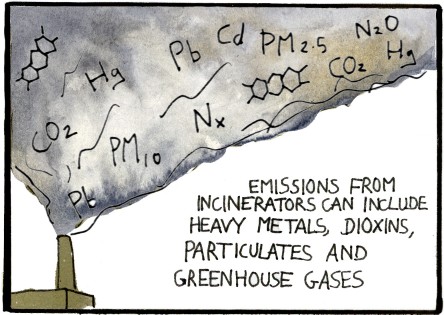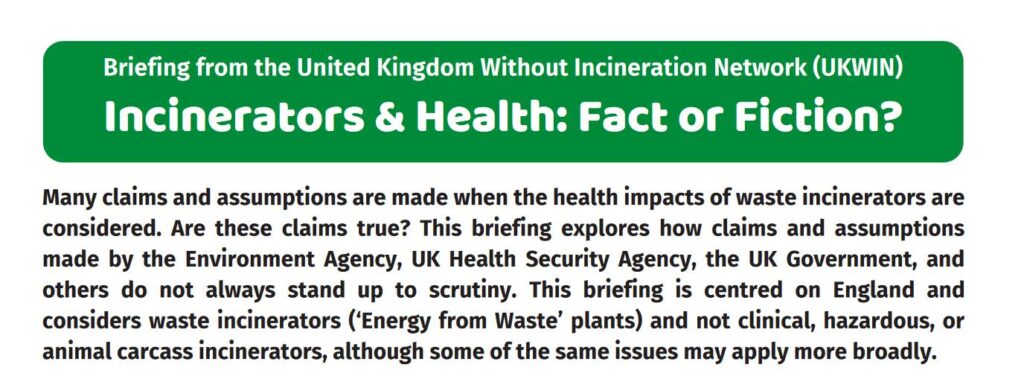
Genuine steps must be taken to minimise local pollution and health risks from waste incinerators. Much more could be done including better technology, higher stacks, greater controls over feedstocks, and more rigorous monitoring and enforcement.

Incinerators & Health: Fact or Fiction?
On 9th November 2023, UK Without Incineration Network (UKWIN) released a briefing entitled ‘Incinerators & Health: Fact or Fiction?’ raising concerns about how incinerators are regulated. The briefing explores how statements made by the Environment Agency (EA), the UK Health Security Agency (UKHSA), and others to justify permitting waste incinerators are undermined by information revealed through information requests.
The briefing and press release are available here:
The briefing shows that key decision about environmental permitting for waste incinerators have been made based on outdated evidence, inconclusive evidence, and in some cases no evidence at all. Once a permit has been granted, an unannounced site inspection is highly unlikely. More than two thirds of incinerators operating in England have never had an unannounced visit from the regulator.
Internal EA correspondence, released as the result of an information request, reveals how an EA air quality specialist raised concerns that it was “hard to square” the EA’s approach to assessing the impacts of incinerator pollution on wildlife sites with the Agency’s duties under environmental protections legislation. The failure was blamed on budget and time constraints, with internal correspondence admitting: “…we just do not have the people or the time available to assess the impacts on so many wildlife sites and meet the target of permitting activities within a given time”.
The Environment Agency says it requires operators to use “Best Available Technique” (BAT), but EA permitting Decision Documents show the EA classifying a technique as ‘best’ where it minimises incinerator operator costs instead of minimising pollution levels.
UKWIN shows how the EA issues permits even where an incinerator is predicted to make a substantial contribution to local concentrations of air pollutants, and how despite this the UKHSA’s assessment of incinerator safety assumes incinerators make only make a very small contribution to the local concentration of air pollutants. UKWIN also provides an example of the EA issuing a permit for an incinerator in an area that already exceeds air quality thresholds.
The briefing argues that: “Falsely denying incinerator health risks undermines public trust, stifles debate, blocks measures to reduce pollution, harms public health, and increases costs to society. Genuine steps must be taken to minimise local pollution and health risks. Much more could be done including better technology, higher stacks, greater controls over feedstocks, and more rigorous monitoring and enforcement”.
The health risks associated with waste incineration is one of the reasons why UKWIN opposes incineration.
“Everyone deserves clean air, and nobody should have to suffer the blight of living near an incinerator. It makes no sense for us to be polluting our environment and putting the health of our population at risk for the sake of incinerators that are completely unnecessary, and yet the Government continues to allow the Environment Agency to grant pollution permits for this outdated technology”.
UKWIN National Coordinator Shlomo Dowen
“As nurses and doctors campaigning against proposed waste incinerators on Teesside, we are deeply concerned about the effects of incineration for the health of the local community. Waste incinerators are an example of health injustice – disproportionately built in deprived areas, often without consent of communities living there. Informed by health and environmental concerns, Scotland and Wales have already placed a ban on building new waste incinerators: our government should be doing the same. We need to invest in improving recycling, reuse and waste prevention as safer, healthier alternatives for the future”.
Dr Kate Bernard of Medact North East
Incineration Overcapacity Harms Recycling
Incineration overcapacity harms recycling, and thus is associated with wider environmental harm. There is already significant public concern about incinerator health impacts, which can be expected to grow as public interest in improving air quality increases and as incineration is seen as an avoidable source of pollution.
There is already excess incineration capacity to meet England’s residual waste targets – see https://ukwin.org.uk/overcapacity/ – and avoiding incinerator pollution is another reason to avoid further overcapacity.
There is an urgent need to hasten the transition to a truly circular economy, an economy without incinerators.
UKWIN Health Briefing November 2023
https://ukwin.org.uk/files/pdf/UKWIN-Health-Briefing-November-2023.pdf